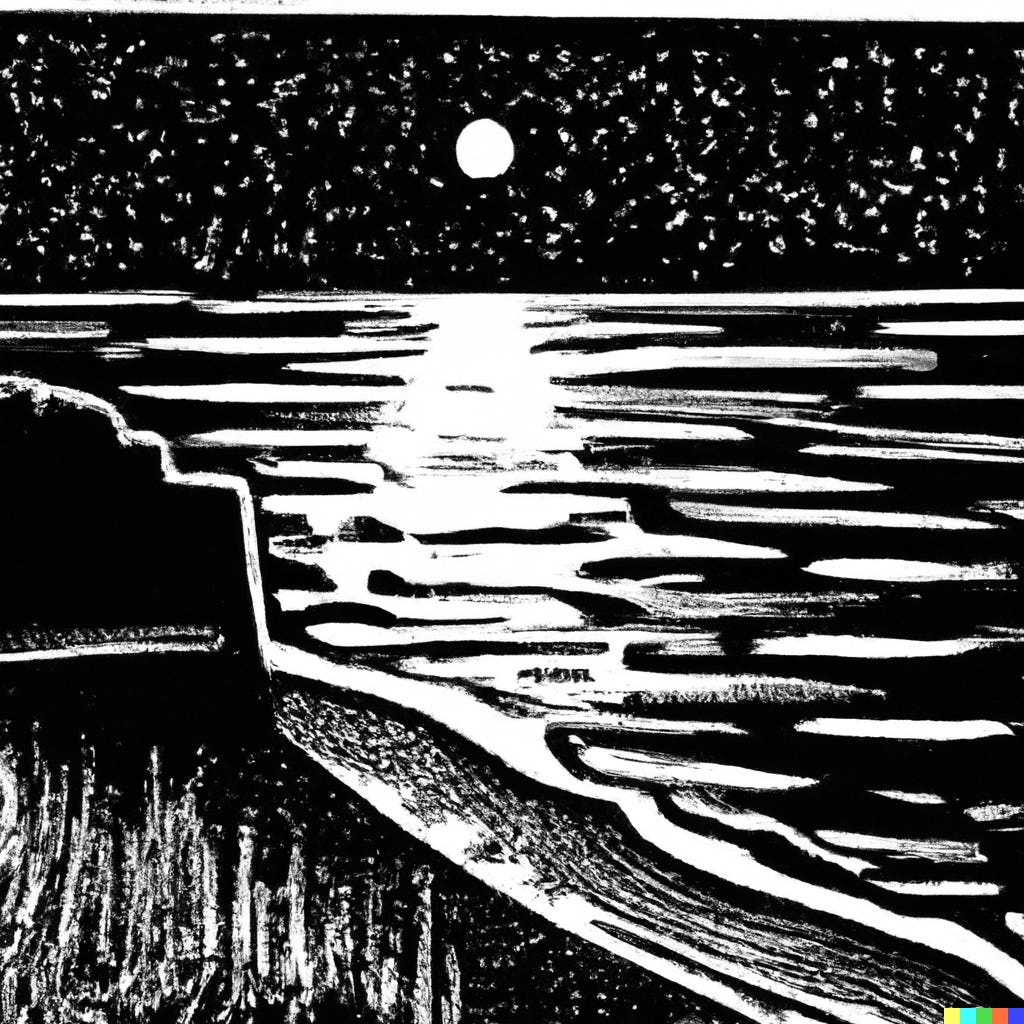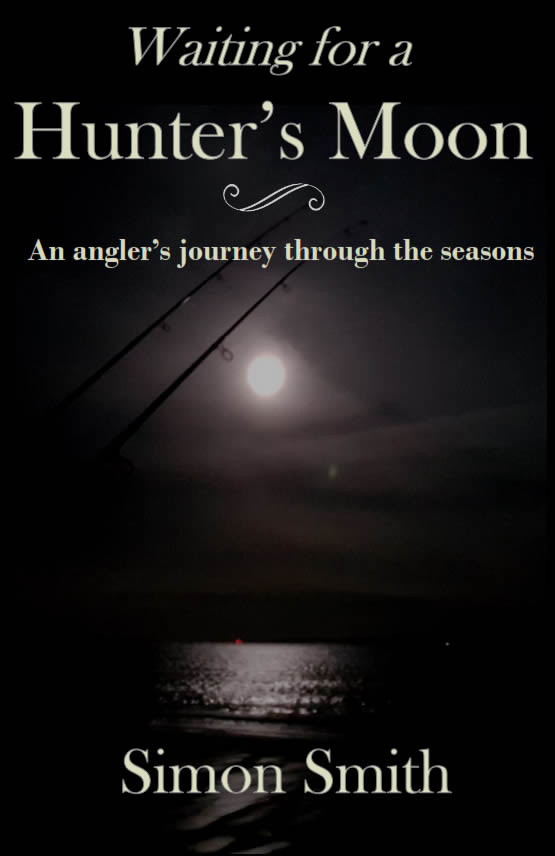Twice each day, the sea takes
what might be the final glance
at all it will outlast.
September spring tides
and the winter storms
resonate with deep, muffled thuds;
beneath the surface those boulders
grind and collide, awkward
in confronting the bare fact
that we can never break water,
only turn it aside.
But while they are still here, and while I am here to fish them, I continue along the short route that I could walk in my sleep, across a flat concrete platform and down, down over a slope of boulders, just one part of the sea defences placed along the length of the beach years ago, that leads to the ragged concrete surface of the breakwater. Before the introduction of the boulder slopes, there was simply a set of concrete steps that led down onto the beach itself. They looked nothing ordinary, but at high tide, when the water reached them, they looked like the entrance to some Tír na nÓg of the imagination. Every summer we would come here on the highest tides and wait for the waves to help with the deliveries from this other world, watching on as the swell heaved and shunted the silvered treasures of whitebait, scad, mackerel, occasional garfish and, if we were very lucky, the bass that were hunting them all, up onto the steps where we would race down between the backwash and the next wave to claim our prizes. Those days are gone now, the steps covered beneath feet of rock, but there lingers a strange feeling that this is a place of passage and of mutability.

Passing the canopic glowering of a lone gull and heading out onto the breakwater itself, I arrive at my chosen spot. To begin with, I feel completely alone despite the scant lights of a couple of others, so I quickly set about the deliberate placement of a base camp. The tripod is set up and rods and reels quickly placed in their notches – one rigged up with a simple flapping Wessex rig that will be cast only ten yards from the outer edge of the rocks, the other with a two hook clipped down rig that will be sent out like a tendril, scouting the sand between 50 and 100 yards out. The petrol lamp is lifted from the bucket, lighted and the whole backdrop is illuminated. A sudden flitting as something alters its trajectory of flight through the lamp’s unexpected pocket of light, the moth dipping and rising and weaving, its trail a faint flicker of a pulse. The small perimeter of brightness seems scant comfort, but the little heat it offers will be enough to warm the hands from time to time and stop the lugworms from freezing in the sub-zero temperatures. Hanging it from the tripod’s bucket hook allows it to throw out maximum light, but as I bustle around it my shadow is cast and magnified onto the shortarm – a larger breakwater further along the beach, stooping, crouching, then springing up malevolently as it mimics and mocks my every movement.
I scan the other anglers to see if I recognise anyone else. I’ve seen the guy nearest to me before – I call him Mister Red Mist, for two main reasons. For one thing, everything about him is red, from his floatation suit to his rod and his reel. He could almost be mistaken for Father Christmas, particularly at this time of year, were it not for reason two – the fact that he tends to use the word “fuck” as a form of punctuation, which in turn gives his face a lingering angry expression that seems totally at odds with his gently sibilant nickname. I can still recall our last conversation some nine or ten months ago going something like
“Caught much?”
“Fuck all, mate. Not fuckin’ bitin’ at the moment and I’ve thrown every fuckin’ thing at ‘em. Brought some lug – big fuckers an’ all – some squid and some mackerel that absolutely fuckin’ stinks, but the fuckers are havin’ none of it. Fuck me, I’m bored.”
For now, I shall take the colour red at its traffic sign values and give him a bit of a wide berth.
The only other angler, thirty yards further along, checks his phone. Its screen casts a weak blue tint that is not enough to illuminate his body but its ‘dismal light’ is enough to make him look like Scrooge’s first glimpse of Marley’s ghost from this distance.
“What do you want with me?” Scrooge asked Marley in Dickens’ tale.
“Much!” came the reply, and in a similar vein, there is much that this season has had to do with me. As the ghosts urged Scrooge to do, I sit and reflect for a minute, particularly on the impact that winter has had on my life and come to realise that the season holds many of my most significant experiences.
When very young, I would spend most weekends at my grandparents’ house, the most distinct bonus of which, for a young boy, was the fact that my grandfather was a building site foreman and would more often than not take me to work with him on a Saturday morning. The men on that site took me under their wing, offering a totally different kind of education and introducing me, at the age of nine, to such joys as strong coffee, and teaching me how to drive a forklift truck, so that many weekends saw me crunching those big tyres across the frost-hard mudscape of the site with a half-mug of Nescafe sloshing around in my hand.
It was also through these men that I learned the joys of the female form and of poetry, both, strangely enough, at the same time. Although I had access to the key of the managerial portaloo, its pristine, bland convenience wasn’t half as interesting as the graffitied wisdom on the walls of the portaloo used by the other men. My grandfather didn’t particularly like my using it, but when he was busy somewhere around the site, I spent hours shivering in there gazing up at the eye-boggling spread-eagled cut-outs from magazines of a less-than-salubrious nature, and reading its earthy wisdoms etched in blue biro, including many instances of what happens to nuns when they walk into bars, such philosophical gems as “I shit, therefore I stink”, and one of the first poems I ever learned by rote:
Here I sit
Broken-hearted,
Tried to shit
But only farted.
There are so many other things that spring to mind, such as my first cider-tainted kiss in a dilapidated, waterlogged old adventure playground that had frozen into iron and ice-rink puddles one freezing December afternoon; those Christmas parties at relatives’ houses that would see my family rambling back home through the streets in the early hours, the empty streets echoing flintily; and then there is, of course, that first experience of night fishing.
No ghosts may visit me tonight, but all these thoughts of the past, along with many others, will appear and disappear as the hours pass.
The baits are laid out on the lid of the bucket – although I’ve brought them, there really is not much need for more expensive worm and crab baits tonight; the fish here will be plentiful and hungry so fish, prawn and shellfish will more than suffice.
The foreknowledge of what can be caught here at this time is no black magic, but it does almost allow an angler a brief glimpse into the future and the opportunity to be prepared. When the voracious winter shoals of whiting, pout and dabs come on the feed there is no time to leisurely cut bait if the opportunity is to be maximised. As such, little tubs of mackerel chunks and sprat fillets are stacked like currency, ready to buy my way into the night. I know of at least a few anglers who refuse to wet a line until they have made an offering to the sea in the form of a silver coin, and now here I am, so near to Christ’s Mass and the celebration of His birth, ready to make my own offerings to some older powers, casting little flickering silver offerings into the black waters.
The first baits are soon in the water – small chunks of fish impaled on size 1 fine-wire hooks tethered to snoods of no more than eight inches in length – when contact is made I want it to be certain. Even though from half tide onward I know the fish will be coming, there is still an element of impatient but peaceful waiting for that first bite which seems wholly appropriate to the season of Advent.
The tide is high tonight, and already it’s pushing up toward the pitted concrete surface of the pier. The gentlest of swells lazily heaves itself past my position, lifting and then lowering the reflections of the stars for a moment before they settle again within my field of vision like ducks upon a rock-shattered pond. In an hour this whole area will be partially submerged, meaning that we will all be in a liminal zone somewhere between dry land and submersion. The scarified old concrete surface has weathered out hundreds of storms and bears the marks in the weed-hung “rock pools” that pit the surface all the way down the breakwater’s length. The tides over the years have done their best to hollow out the space beneath my feet and now the rising tide forces air around in a hissing, gurgling broth of air and seawater.
The first isn’t long in coming, though it’s not to my rod. Further up toward the breakwater’s end there is a shout and a white flexing flash zips through a circle of light, a dogfish, most likely, judging by the size and shape, closely followed by a body stumbling down from the rocks. The body’s companions close in, a shadow at a time, to take a quick look at the fish before receding again, and the fish is quickly released back over the side, a short incomplete arc of white that disappears from sight before it reaches the water.
As I watch the goings-on further along, a sharp movement from the corner of my eye catches my attention, forcing my head to involuntarily swing around just as the last vibrations tremble from the tip of the rod fishing nearest the rocks. A breathless moment; always this breathless moment. Many wouldn’t even bother to sneer down their nose at what I’m guessing this might be, but the whiting truly is my favourite fish, so representative of my first nights spent so far from the comforts of bed and home.
After spending so much of my early years tucked away from the night-time realities of the big wide world, my earliest night sessions seemed incursions into some other existence altogether, an existence where the town was amazingly quiet and still; the cool night air even smelt different to the daytime air. This was all about going beneath the surface, about living by a different set of senses in a shamanic dream world where time seemed to melt away and murmurations of whiting passed through like starlings. And so the humble whiting become attached, a kind of spirit-animal, to my nocturnal consciousness and all my after-dark ramblings.
Still I wait. Could I have imagined it? The human eye is so unreliable, especially in such poor light. No, no mistake; here it is again, a positive rattle.
Quickly, I lift the rod from the stand and my light tentatively pokes out over the water in front of me, scanning for whatever breaks the surface. A double shot of a whiting and a dab breaks surface only ten yards out and flutters into my circle, safely claimed. It is only a small job to unhook them and slip them back - too small, or these delicious little fish would be coming back for the pan.
Deeper into the small hours we descend, the temperature plummeting, the air cut to pieces on the keen edge of an easterly wind. Our lights burn on, though now, in the freezing cold small hours, they don’t seem so solid and certain, as the flecks of rain so cold that they seem to steam, corroding and pitting the headlamp beams like the surface of old iron pipes.
Still, none of us has drifted homeward yet. For hours now, people and fish have flashed in and out of the light and we have all watched from our own little colonised patches, catching these glimpses of other lives playing out, their busyness, testing energy, bait supplies and enthusiasm almost to their limit. And still, over the top of the tide and into the beginnings of the ebb they come – whiting; pouting; codling; dogfish; dab; all reduced to white flickers in the lights, passing through and then into darkness again like little phantoms.
None of us can leave: we are haunted men; haunted by these little visitors, haunted by the year growing ever older, haunted by the knowledge that, although we can, theoretically, pack in and re-join the real world at any time, winter will still be there waiting for us in its iron-hard, year-spanning persistence.
The rain stopped over an hour ago as the temperature completely dropped out of the night, but now my final session of the year seems set to end in the way that the first one of the year began – the snow has arrived again. It’s nothing like as heavy as that first snow, but enough to show up in the headlamps and provide a short distraction from the insatiable shoals.
It’s light enough at the moment to watch individual flakes fall until they disappear, dissolved into the wetness of the pier’s surface or evaporating with a tiny hiss the second they hit the hot pressure lantern. The image of snow rings a bell in my head, and for a second I am too tired to make the link that my brain is trying to force upon me until it finally clicks. I spent half an hour a few days ago, reading about a man called Wilson Bentley, or ‘The Snowflake Man’ as he later became known. By chilling a tray of velvet, he was able to capture snowflakes without their melting then, through long years of basic but meticulous photography and scraping, managing to prove that every snowflake is individual while, in the process, collating a catalogue containing thousands of some of the most wonderfully illuminating images of snowflakes that are still fresh and beautifully intricate now, over a hundred years after they were produced. The man who made microscopic milliseconds last a lifetime.
If Wilson Bentley managed to work with such patience and diligence, harvesting a lifetime’s worth of moments, I can certainly manage awhile longer, snow or no snow. So, it seems that there is nothing else to do; I shall fish on through the ebb and the darkness and all the snow’s little epiphanies, casting blindly toward a dawn that still seems so very far away.
Serialisation of ‘Waiting for a Hunter’s Moon’ by Simon Smith (with permission). This book is published by and can be purchased from Cambria Books HERE
Paying or pledging subscribers to Cambria Stories receive the eBook version FREE!

Thanks for reading Cambria Stories! Subscribe for free to receive new posts and support our work.

